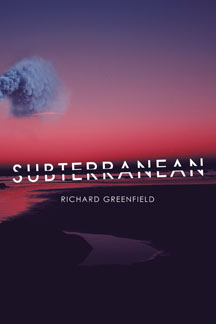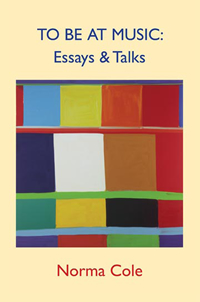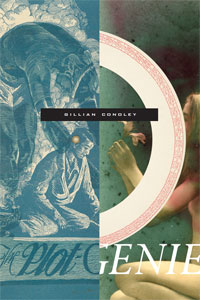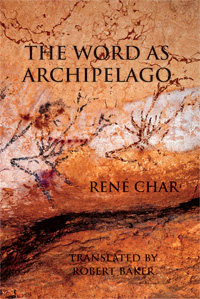Description
The elegies that comprise Richard Greenfield’s third book of poems, Subterranean, open the rhetoric of the form in new ways, creating a site of grieving that transcends a focus on the death of the father. These elegies, lyrical and yet absorptive of contemporary political economic discourse, juxtapose the collapse of hyper-economies against the collapse of ecosystems, exploring the overlap, or edge effect, of liminal encounters between the living and the dead, between the city and the wilderness, between the human and the animal, and between the haves and the have nots. In a raw counter music to these elegies, Greenfield also uses the method of transcription—unedited recordings made on long walks—to create a sequence of associative, anxious, rambling, and digressive meditations bridging these harrowing divides and exposing the loneliness of grief and empty promise of connection in the age of late capitalism. Is elegy an empty or arbitrary promise of connection between the living and the dead? As Greenfield asks, “Do you want to call someone?” The human voice, transmitted through the cell phone, becomes a spectral voice and streams “up from the basin to the peak and its antenna and striates and sieves through solid structures to arrive in the spiral of the ear of anyone.”
With transcriptions, lyric interludes, and thick description, Richard Greenfield speaks to, for, and about the dead, and in particular his father, lost to the larger orders of the kingdom of the gone. The poems in Subterranean sing through all of it reminding us that poetry has a vital role to play in the act of living and dying. It’s gorgeous and heady work.
Peter Gizzi
Like oracular and elegaic poets from Alice Notley to It? Hiromi to Whitman, Richard Greenfield holds out to us a fistful of blooms at once lotusy and razory; his verses change the vision and cut the palm. Subterranean is a katabasis for the dispossessed, mourners and migrants who have not been granted a trip to Elysium but must instead tread and retread the American desert border: “giant yucca strained the ejecta/I had no tactic.” This book reminds us that elegy does not help us reach a horizon line but, by obsessively mapping the distance to it, increases that unbreachable distance. The grief of Subterranean, then, is that it is ultimately terranean.
Joyelle McSweeney
One of the most enduring specters haunting American Letters for over 150 years has been Emily Dickinson. From her fiery lineage, poets as diverse as Lorine Niedecker, Fanny Howe, Rae Armentrout, and other intrepid inner rebels have kept the revolution of the continuous critique of prefabricated self-&-society going strong. And out of this feast of plucked flowers and winnowed seeds, comes yet another scuffed up sensitive soul ready to not just “take flight” (in either a romantic or “avant” mode) but rather, foot-steady to burrow deep into the soil of materialist deliverance. Tending to the roots of our epoch, until the scowling winds of Vain Authority subside, Richard Greenfield (poet of uncommon touch, deft discrimination, fortitude, and tactical self evacuation), is carting over a barrel of wicked hooch for us tonight. Let’s give this tome a real read, huh?
Rodrigo Toscano
Growth used to be growth before it ate itself,” writes Greenfield (Tracer) in his challenging and transfixing third collection. . . . Ostensibly an elegiac musing on the death of a father, the collection exerts itself through strange, contorted language to account for every thought a death might affect.
Publisher’s Weekly Starred Review
Reviews
About the Author
Excerpt
Richard Greenfield is the author of three books of poetry: Subterranean (Omnidawn), Tracer (Omnidawn), and A Carnage in the Lovetrees (University of California). His work has been anthologized in Joyful Noise: An Anthology of American Spiritual Poetry (Autumn House Press), The Arcadia Project: North American Postmodern Pastoral (Ahsahta Books), and most recently in Privacy Policy: The Anthology of Surveillance Poetics (Black Ocean). He is one of the founding editors of Apostrophe Books, a small press of poetry, and is editor-in-chief of Puerto del Sol. He was recently a Fulbright Senior Lecturer in American Poetry at Ewha Woman’s University in Korea, and is currently a professor of creative writing at New Mexico State University.
^ back to menu
SUBTERRANEAN
The mole noses into a hole and dements it I see the dead in the
molehole he may be my hostage unwilling guest hostile at the
doorway of the willing I see the arm of the chair but not the chair
I see only peripherally the “effects” which make use of light
One effect is a dull metal penknife each blade’s nail mark is an
impressed-into smile for a fingertip the small spey blade turned
outward from its slotted bed ends in a broken tip that might fit into a
screw’s slot
One effect is a wallet black leather a crinkly skin of enwrapment
breathes through empty card slits one effect is a bottle of cologne I
fingered the stench along my neck in the mirror eau de black calf
standing on one leg eau de dry fly in a sill in a peaking crown of legs
Warm this week middle happiness in walking a dog I am alive and
questions are more contrived under that condition the dog keeps
lifting his leg to lean into the thing he would invisibly sign an ending
scrap of sunlight beneath a pecan tree remnant of its orchard it will
be a memory of a scrap of light not so much useful as available
whirling the nutty debris of limbs discarded ineffectually to the soil
Animals in emaciated limbs anonymously look outward from the nether
mouthing their fading needs to each other because they have no
discrete walls against which to reverberate their private atrocities
Placeless grief revs in the queasy-sweet flowers in the obscuring canopy
a net to catch the weightless junk falling from above night fully
named the huge tangled patriarchy of branches the stars tingling
irretrievable
Comes an owl vomiting pellets birthing bones an eidolon
among burned out stars that burn in the now in a different dimension
of dream-land laughter there again at the limits
Now I know nothing is unspeakable or is contained
I swing toward the negative space of the outlines of homes blue auras
in windows a marigold resonance in yards the immaculate
pretense the hostage wants wreaths for a welcome
^ back to menu




